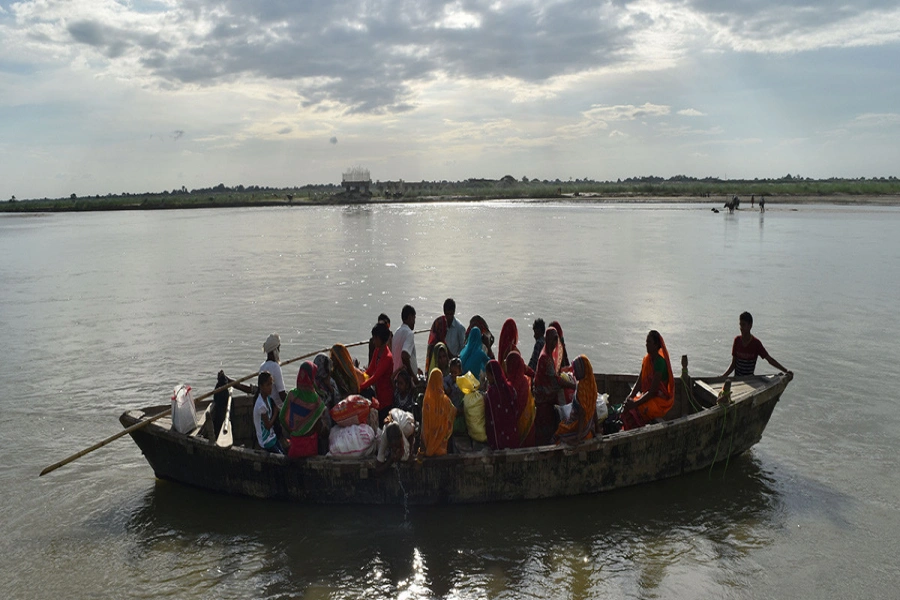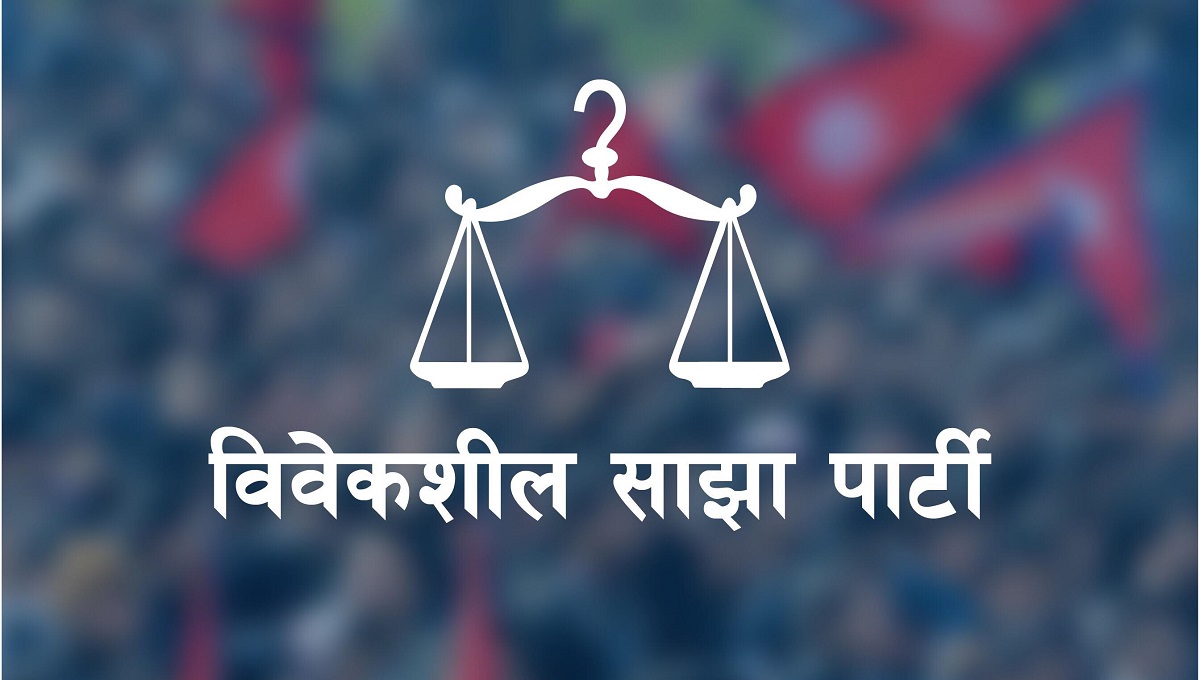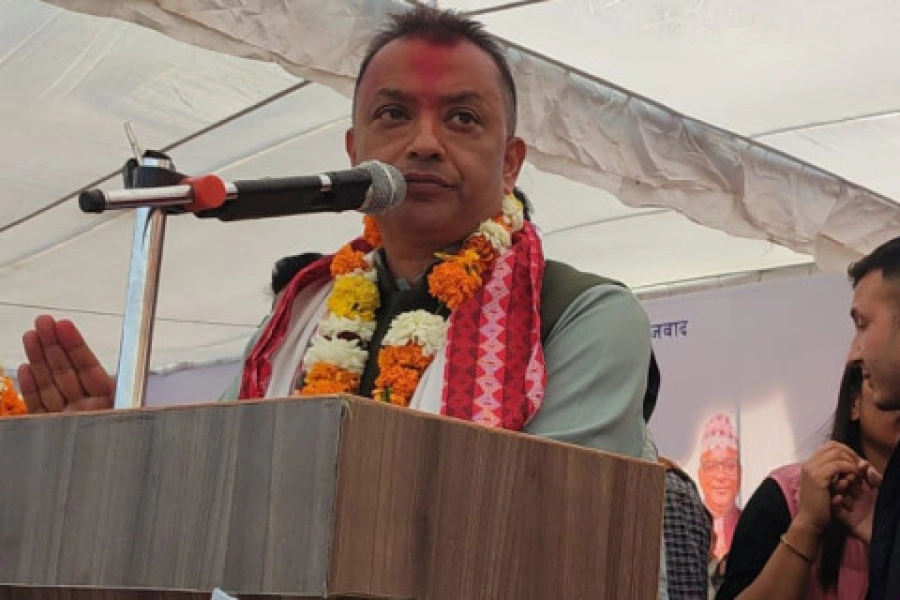In most Nepali societies, the animals, brought up with love and care, are very often sacrificed as a token of submission to the command of the almighty. The trend of submission to God and sacrificing our ill wills has turned into a show of wealth. So they buy the highest-priced goats and show off in society as well as on social media with pride.
Gadhi Mai in Bara district was known for the sacrifice of thousands of goats and buffalos. Though many are unaware about the Rajdevi temple of Janakpurdham, it is equally famous for sacrifices of goats on 8th day of Dashain. Locals believe the ritual of slaughtering goats here at the temple has been taking place since time immemorial.
Hindus in Nepal customarily offer goats for sacrifice to appease the God and Goddess, especially Durga and Brahma, for peace, property and prosperity. Around 15000 goats are sacrificed on Asthami every year in Rajdevi temple. The slaughtering generally begins after 7:30 PM and concludes before sunrise (6 AM).
People consider this act as a vow to the gods. But the festival held every year at Janakpur, the capital of ancient Mithila, is condemned every year by animal rights activists. However, the devotees and pundits are not in favor of putting an end to this centuries-old ritual of sacrificing animals. They believe that the Hindu devotees bring animals to please their goddess Kali.
SC tells govt to stop cruelty against animals

The animal sacrifice has been considered holy in the Hindu scriptures. It has been mentioned in 10th verse of the 12th chapter of Durga Saptashati. Besides, Devi Bhagabat and many other religious texts also advocate for animal sacrifices to please the almighty.
People in Janakpurdham who offer sacrifices to goddess Durga believe that the goddess Durga would bless them with peace, prosperity and success if they sacrifice goats on the eighth day of a ten-day Dashain festival. Some often say there would be uproar, not only in Janakpurdham, but also across the country, if animal sacrifices are completely stopped.
People have made animal sacrifice a means to satisfy their hunger. Some of those celebrating festivals have even started offering goats to celebrate picnic or just for the sake of festivity. What annoys many is that the pundits who are involved in animal sacrifice are vegetarians but they support and encourage the devotees to offer goats saying that such an act would appease goddess Durga and that she would fulfill their wishes. But they never disseminate a message that Hinduism is a religion of peace and it does not support such killings. God cannot be satisfied by the blood of innocent animals. It’s time to end killings once and for all in the name of religion.
Nepal is a member state of the World Organization on Animal Health (WOAH). The member states are duty bound to ensure five basic freedoms to animals that include freedom from hunger, thirst and malnutrition, freedom from fear and distress, freedom from physical and thermal discomfort, freedom from pain, injury and disease, and freedom to adopt normal behavior.
As a member of WOAH, the state can intervene by enacting legislation or striking a balance between the law and religious practices. We need a law that ensures procedure of killing so as to cause them least pain and trauma, if killing cannot be stopped altogether. Sadly enough, the goats are killed by untrained persons causing them much pain. The innocent animals, who have no voice and cannot fight back, are killed and other goats also see their fellow animals being killed.
Moreover, animal sacrifice is not limited to any particular religion or community. There are many communities in the southern plains of Nepal which believe that animal sacrifice rituals bring them success and prosperity in business. If they don’t do it, they believe, there might be no success. But this sensitive issue should be wisely dealt by representatives of the people. If it’s a person’s religious practice to sacrifice animals, then there should be criteria on how to kill them without causing least pain.
The practice of sacrificing goats at holy Rajdevi temple has not helped the local economy. Goats are often imported from neighboring Indian markets, which means Indian farmers get the benefits. Many purchase big, healthy and expensive goats to offer to goddess Durga. Then they preserve the meat for a few days and organize feast. No religious books support this practice. Animal slaughtering can’t please the god.
Yes, the constitution has safeguarded religious freedom but this should not mean blanket freedom to sacrifice animals. Every right comes with certain limitation. Freedom to sacrifice animals should also have certain restrictions.
Slaughtering in the name of ceremony or religion is evil. The days when when there was no discussion on rights of animals are over. Like us, they too deserve rights and respect. Hinduism is the religion of peace.
Let’s stop animal sacrifice. If we cannot do that, let’s at least think of adopting measures that cause least pain to animals. A complete ban may not be possible today. Let’s think what is possible today.
The author is currently Judicial Officer at Janakpur High Court, Birgunj Bench




































